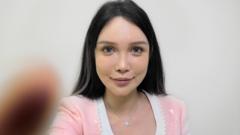In recent years, the landscape of health and wellness has seen an alarming rise in unqualified influencers promising cures for various conditions, including Polycystic Ovary Syndrome (PCOS). PCOS is a hormonal disorder affecting an estimated one in 10 women and can lead to painful symptoms like irregular periods, anxiety, and weight gain. However, many women seeking solutions have found themselves caught in a web of misinformation and unverified treatments propagated by social media personalities.
Sophie, a 12-year PCOS sufferer, found herself paying $3,600 for a health protocol and supplements from Kourtney Simmang, an Instagram influencer who claimed to address the “root cause” of PCOS—a claim that science has yet to support. Third-party reviews from professionals like Dr. Jen Gunter highlight the dangers of influencers who lack medical training but present themselves as health coaches. Dr. Gunter asserted that the tests and treatments marketed by Kourtney had limited clinical credibility, and Sophie found no relief after a year of following her regimen.
Documented analyses reveal that many influencers misinform their audiences, particularly on platforms like TikTok and Instagram. Out of the most popular videos tagged with "PCOS," half perpetuated false claims such as dietary supplements curing PCOS or birth control pills exacerbating symptoms. Despite TikTok's guidelines against false content, misleading health information remains rampant.
Among the most notorious influencers is Tallene Hacatoryan, a registered dietitian with more than two million followers, who sells high-priced supplements while downplaying pharmaceutical options like birth control and metformin, which have been found effective for many women. Her endorsement of restrictive diets, including a low-carb ketogenic plan, has caused many followers like Amy from Northern Ireland to feel defeated and unwell, reinforcing feelings of inadequacy tied to their appearance and health struggles.
Experts have voiced concerns that misleading health advice from influencers can lead to serious emotional and physical consequences, including the development of eating disorders. Medlyn, a medical student from Nigeria, has started empowering other women to embrace their PCOS diagnoses while consulting healthcare professionals rather than supplement peddlers.
Organizations like PCOS Challenge, led by advocates such as Sasha Ottey, emphasize evidence-based treatments that can enable women to conceive and manage their symptoms effectively. Dr. Gunter advises those whose needs aren’t being met by general practitioners to seek specialists.
The experiences of Sophie and others highlight a critical need for medical professionals to guide women through the complexities of PCOS, as relying on social media can perpetuate a cycle of misinformation and desperation that ultimately hinders their journey toward health and acceptance.





















